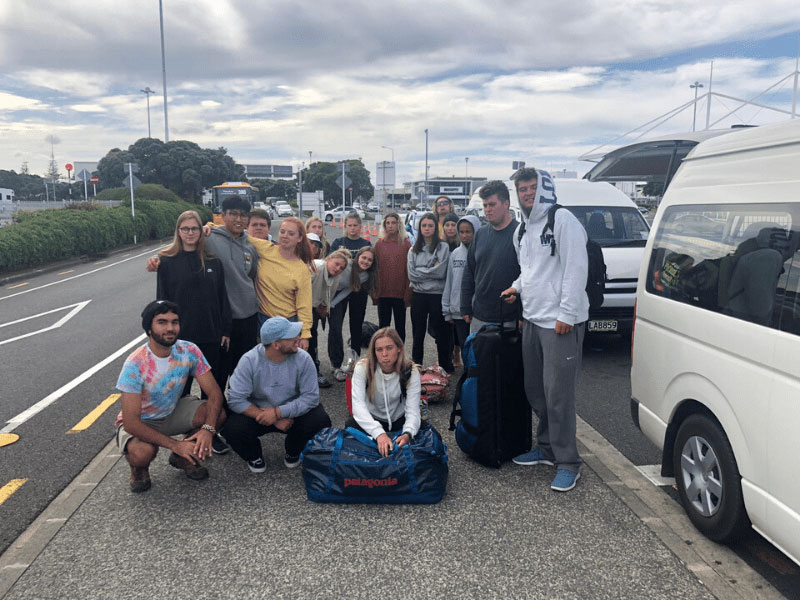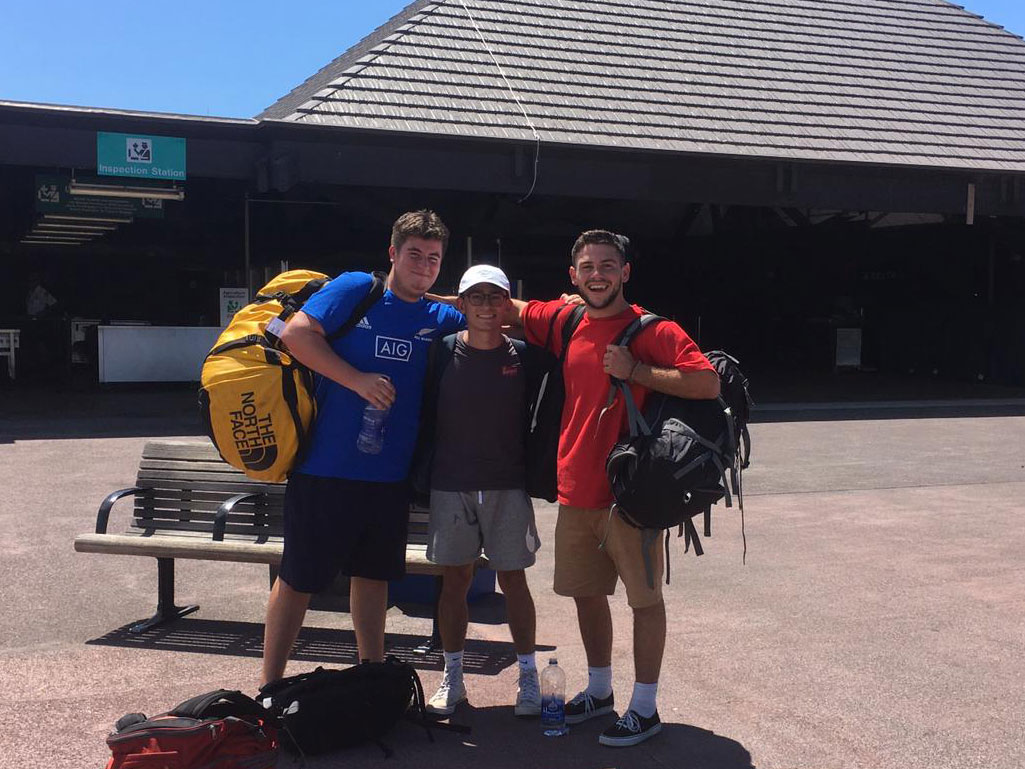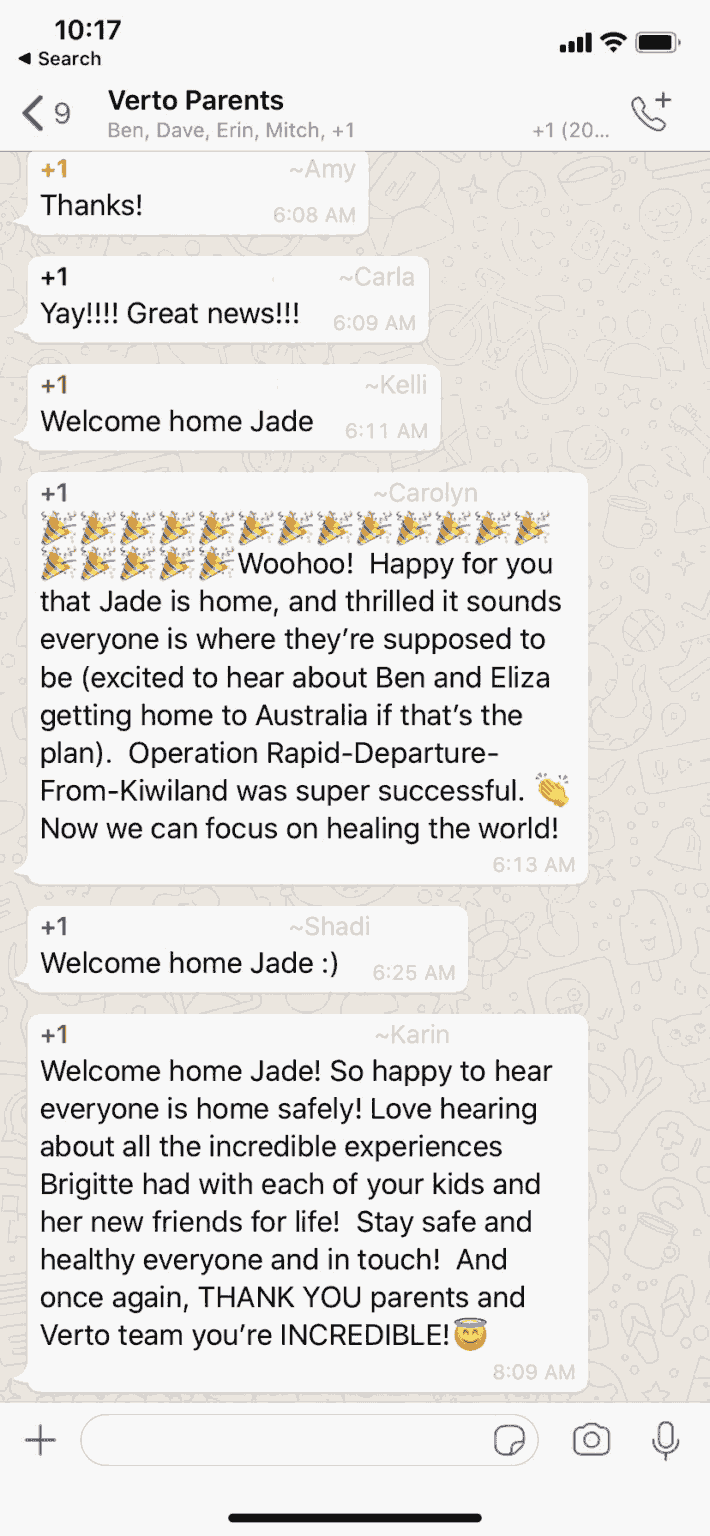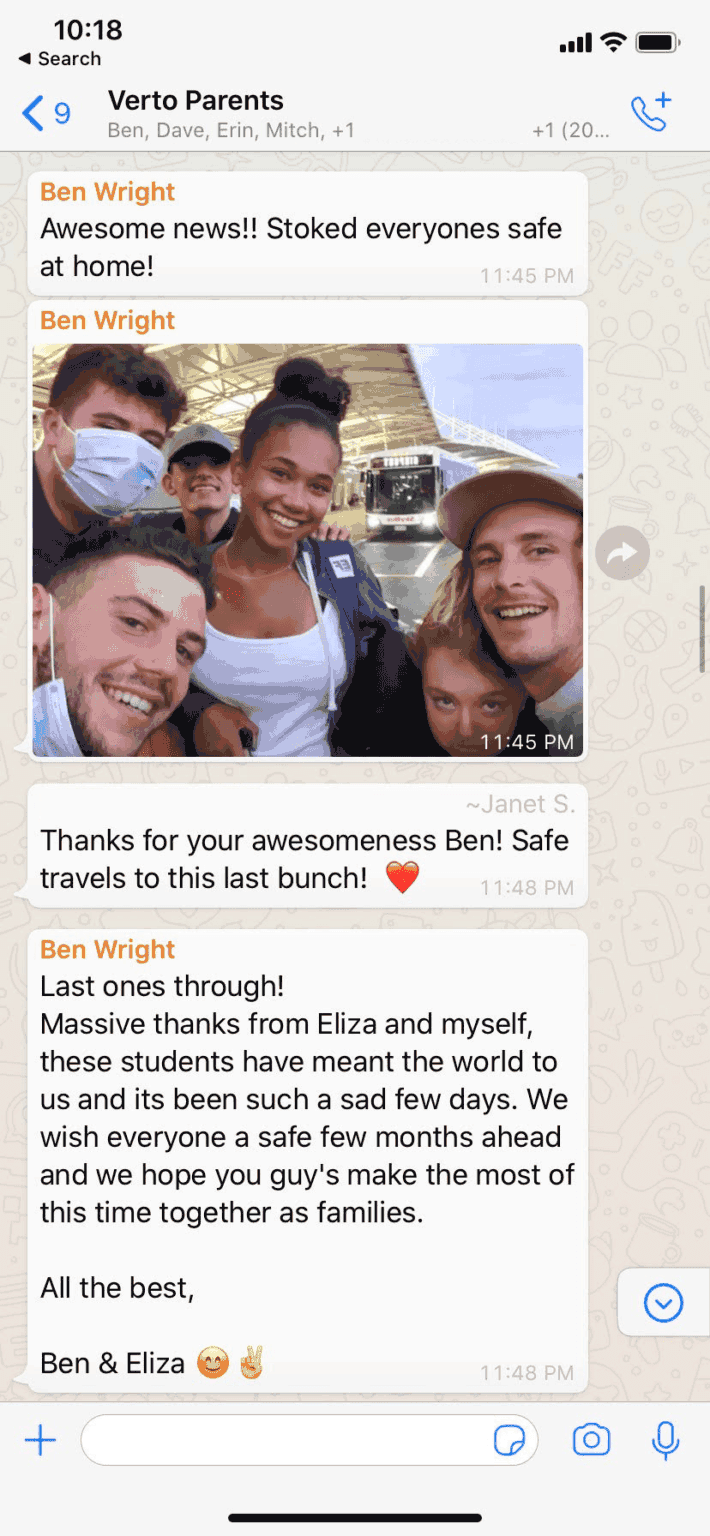This week, the Verto team had to make the tough decision to bring students home from their semesters in Latin America and the South Pacific. We sat down with two of Verto’s founders, Mallory Meiser and Mitch Gordon, to learn more about how Verto has navigated the onset of the Coronavirus pandemic. They share about what led to their decision to evacuate students, why Verto’s mission is more important now than ever, and the future of Verto moving forward.

Mallory and Mitch, thanks for joining to tell us more about Verto’s response to this global crisis. As the Coronavirus situation began to escalate, what was the reaction of the Verto team? How was Verto able to stay informed and respond accordingly?
Mallory: Our first priority is always student safety. At the early stages of the outbreak, we felt very confident that students were safe in their respective countries (Costa Rica and New Zealand). Many parents agreed that students were actually safer there than in the United States! Initially, our response was to take precautions by creating contingency plans that would ensure students were in more rural, private accommodation. In Costa Rica for example, we looked at moving students out of their San Jose homestays and into our base-house in La Fortuna.
As the situation progressed and countries began closing their borders though, we knew we had to reassess the situation. We were in constant conversation as a team, playing out different scenarios in order to determine the best course of action moving forward.
We worked closely with our colleagues in international education who were facing similar difficult decisions, sharing the pieces of information that we each had and collaborating on the decision-making process.
Mitch: Dave Dennis, our Director of Health and Safety, was also extremely instrumental in these discussions. He is the foremost expert in risk management for study abroad and international travel and we hired him because of our uncompromising commitment to putting student safety first. We are extremely lucky to have the best on our team and to have had him there as we navigated the situation.
Dave also has contacts at International SOS, the world’s leading travel and medical security services company, and direct contacts in the government, so we were able to get up-to-date information as soon as it became available.
As the situation unfolded, how were you able to keep families and community partners in the loop?
Mitch: Our goal was always to over-communicate. We generally have a 24-hour response policy, but in this case, we were replying to parents and students within minutes. We held a town hall for all of our families in order to create an open dialogue and allow parents the opportunity to express their opinions and concerns about the situation.
Mallory: We also created a WhatsApp group to keep in constant communication with families and send live updates and photos from our team on the ground. It was a great way to build community.
Mitch: It was imperative to us that we keep families updated and include them in the decision making process. We practiced a framework of “inform not convince” where we presented information candidly and made it clear to parents and students that we would be there to support whatever decision they may want to make.
What were parents’ responses to the Verto team?
Mallory: I think our approach really served to increase the trust of parents and students across the board because they could see how hard we were working, how much we cared, and how committed we were to making informed decisions. We could see how much this meant to them through the great feedback we got on our whatsapp and email chains.
Can you describe more about how you ultimately made the decision to bring students home?
Mitch: The first question we always started every meeting with was, “Can we keep the students safe?” Safety is number one and that will always be the case with Verto. The second question was, “Can we continue to run a highly effective program in the midst of everything that’s happening?” Ultimately, we felt that our ability to run effective programming was compromised. The students’ mobility would be limited and everything was starting to close down in those countries. In Costa Rica for example, our students’ Public Health coursework revolved around visits to hospitals and schools and great talks at NGOs– all places that we no longer had safe access to.
Mallory: An additional reason for our decision was that countries started closing their borders. It was critical for us that we could access our students and staff and that they would have the ability to come and go freely.
In both Costa Rica and New Zealand, we were able to get everybody home within 48 hours.

So, now what? What will the semester look like moving forward?
Mallory: We have used the last week to build the schedule for the semester and bring our curriculum online. Verto has the huge advantage of already having small class sizes and close bonds between students and professors, which makes the transition to online learning a little easier. We are using an asynchronous learning approach as often as possible, so classes will incorporate small group activities and hands-on learning in any ways that are available to students. This could be interviewing family members about Public Health issues or doing some digging in the backyard for Environmental Science exploration. Ultimately we are working to create as experiential of an environment as we can online.
We are also still working with our ground providers to add international flavor to all our courses. Students taking Environmental Science will get to learn directly from experts working on the Great Barrier Reef in Australia and students studying Public Health will hear from our local partners around the world about the effects of Coronavirus on their respective communities.
Mitch: We are also working on strategic partnerships with organizations like the Minerva Project to bring our courses online in an interactive and engaging way.
Outside of coursework, how will Verto continue to offer an exciting semester for students?
Mallory: In addition to their courses, students will enjoy two or three community events each week. A few of the events we have planned so far include:
– Student Movie Night
– Re-entry Webinar with Mental Health Advisor
– Guest speaker series (covering everything from personal finance to entrepreneurship)
– Mixers with other Verto students and alumni
– Verto Parent Happy Hour
We will have shared meals, storytelling, journaling, and art sessions. Some of our events will be open to prospective students and families so stay tuned for invites!
Mitch: One of the most exciting parts of our mission as an organization is our goal to increase human connection and create community. Even though we are doing it online now, we remain committed to fostering community for students, parents, program leaders and faculty.
How has this crisis impacted your belief in the mission of Verto?
Mitch: If we ever thought as a society or as a world that we are not all connected, this has proved us wrong. The impact of this virus has made us even more resolute and determined to further Verto’s mission of building genuine cross-cultural understanding and compassion.
Mallory: It is powerful to think about the unique appreciation our students have for people around the world who are going through this. They have been in communities that could be devastated by this virus. Their understanding of the impacts of this disease are a lot deeper than your average college freshman and even your average citizen.
Mitch: That level of empathy is invaluable, especially as we are seeing the difference between good and bad leadership around the world. It is becoming increasingly clear that if we want better, more compassionate leaders, we need to give young people meaningful experiences abroad. If every human being had the opportunity to experience something like a Verto semester, the world would be a different place. I feel strongly that our mission is more important than ever.
What is the future of Verto Education? Is the fall 2020 semester expected to run as planned?
Mitch: We are 100% still planning on running our fall 2020 semesters as scheduled. A big advantage of Verto is that we operate in different countries, so in many ways we are an even safer choice for students than an American college campus because we have different options. We are committed to keeping students on track with their education and Verto has a guaranteed refund if any of our programs cannot run, so families can feel secure planning ahead with us. We are the safest option out there for having quality semesters run this fall.
Mallory: A core part of our mission, affordability, is going to be even more important this fall as more families struggle to afford higher education. We are committed to offering Verto as the most affordable way for students to start college.
Mitch We do not know what the world is going to look like in six months but we are planning for the best. We are moving forward, let’s do it together.
More articles on Fall 2020 College Planning:
Verto Education’s Fall Programming Scenario Plan: Read Verto’s proactive approach to how we deliver transformative semesters in every possible scenario this fall.
Verto Education’s Fall 2020 Enrollment Guarantee: Learn more about how Verto commits to making all our students first-year college students this fall, regardless of delivery mode.
Verto Education’s Latest Updates on the Coronavirus: What are Spring 2020 students up to now? How do you monitor public health in your destination semesters? Get an inside look at how Verto’s team of travel experts navigated the pandemic.
Our Commitment to Safety on Verto Semesters Abroad: Hear from an industry expert, who also happens to be Verto’s Director of Health and Safety, on how Verto continues to manage health and safety concerns on our programs.
Verto Limits Fall Class Of 2020 To 500 Students: Read more about the decision to limit our fall class in order to ensure every Verto semester includes the customized support and immersive experience we’re known for delivering.



